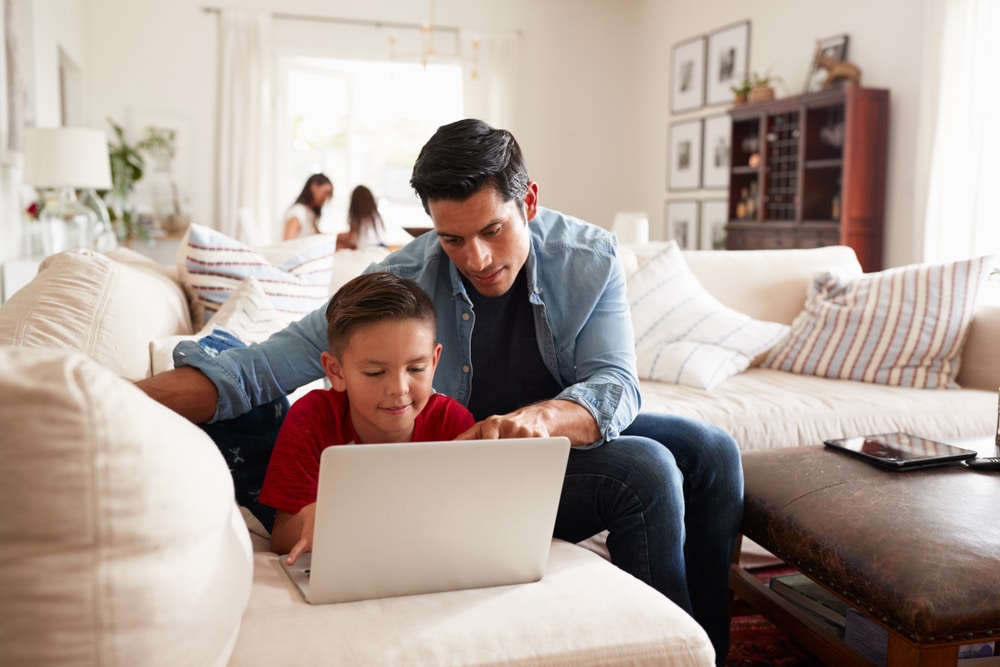Proactive parenting techniques such as implementing prohibitions on screen usage in bedrooms and during meals, in addition to demonstrating positive behavior, can mitigate the challenge of excessive screen time for children, as noted by a UCSF investigation.
For a multitude of parents, the prospect of reducing their offspring’s screen engagement seems like a futile effort. Nonetheless, fresh insights from the University of California, San Francisco have identified the optimal parental methods for curtailing screen time and impulsive screen activities: enforcing rules against screen presence in sleeping areas and during meal consumption, and illustrating thoughtful screen usage habits at home.
Investigators solicited information from adolescents aged 12 to 13 concerning the frequency of their screen usage for non-academic purposes, such as gaming, messaging, utilizing social media, partaking in video discussions, observing video content, and navigating the web; researchers also sought to determine if these engagements with the screen were problematic.
Subsequently, they inquired with the parents regarding their own screen usage when in sight of their offspring, the vigilance and limitations applied to their children’s screen engagement, and if screens were utilized as a means of reward or sanction. Queries were also raised about the family’s habits around screens during meal times and the juvenile’s screen usage within the bedroom.
Screen utilization in the bedroom and during meal times was associated with an upsurge in usage duration and addictive usage. Nonetheless, these numbers diminished when parents oversaw and confined their progenies’ screen engagement, and when they themselves set an example of sensible screen use.
“The insights from these findings are optimistic, offering guardians a range of tactical approaches they can enact with their adolescents and young teens: enacting restrictions on screen time, supervising your youngsters’ screen usage, ensuring screens remain outside bedrooms and are switched off during meals,” articulated Jason Nagata, MD, a physician specializing in pediatrics at UCSF Benioff Children’s Hospitals and the predominant author of the review, scheduled for publication on June 5 in Pediatric Research. “It’s likewise beneficial to adhere to the advice you give.”
The evaluation gauged the impact of parenting methods endorsed by the American Academy of Pediatrics (AAP) for individuals between the ages of 5 and 18 on pre-teens. It is among the few to scrutinize the influence of parental guidelines on screen consumption during the early stages of adolescence, a time when autonomy begins to flourish.
“Our prime interest was geared toward the younger teenage group, given they are at a juncture where the use of portable telecommunication devices and social platforms typically escalates and paves the way for subsequent conduct,” noted Nagata.
Data was amassed from 10,048 participants within the U.S., with 46% stemming from minority racial or ethnic groups, as part of the Adolescent Brain Cognitive Development (ABCD) investigation.
Parents provided ratings from 1 to 4, registering their conformity with statements like, “My offspring succumbs to slumber employing a screen-based gadget.”
An exploration into how these parental acknowledgement levels forecasted the young ones’ all-day screen usage revealed an increment of 1.6 hours for each point associated with bedroom screen usage. The same was true for screen employment during dining times, which augmented the duration by 1.24 hours. Inadequate examples set by guardians increased the time by 0.66 hours.
Confining and monitoring the adolescents’ screen exposure diminished it by 1.29 hours and 0.83 hours correspondingly. However, employing screen time as either an incentive or penalty proved fruitless, resulting in an increase of 0.36 hours, as well as heightened problematic gameplay.
When utilized judiciously, screens can play a role in sustaining social ties and fostering a sense of group identity, yet excessive screen usage by youngsters can prompt mental health conundrums, physical inactivity, and sleep disturbances.
“Bedtime screen engagement substitutes necessary sleep, which is pivotal for the well-being and development of young adolescents,” Nagata highlighted. “Guardians might consider maintaining screens out of their progenies’ sleeping zones and deactivating gadgets and their notifications for the overnight duration.”
Image Source: Monkey Business Images / Shutterstock






























